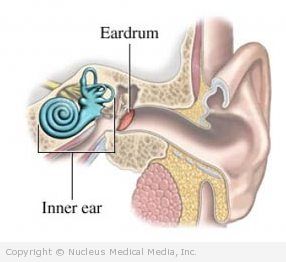Audiometry
(Hearing Assessment; Hearing Test; Audiology; Audiography)
Audiometry – Definition
Audiometry is a test that measures how well you can hear. This test is performed by an audiologist. An audiologist is a person trained to identify and help manage hearing problems.
Audiometry – Reasons for Test
This test is done to detect or monitor hearing loss.
Audiometry – What to Expect
Audiometry – Prior to Test
Your audiologist may ask you:
- When your hearing difficulty began
- If it affects one ear or both ears
- If you hear ringing in your ears
- If you have ever had pain or discomfort in your ears
- If there has been any recent drainage from your ears
- If you have ever had ear infections
- If you have ever had an ear injury
- If you have ever had ear surgery
- If you ever have dizziness
- If there is a family history of hearing loss
- If you are exposed to a lot of noise at work
- If you often ask people to repeat themselves
- If others have commented that your television is too loud or that you speak too loudly
- If it is hard for you to understand a conversation when you are in a large group or a noisy place
If your child is being tested, the audiologist may ask about:
- Difficulties with speech and language development
- Other developmental issues
- Difficulty in school
- Health history
- Family history of permanent childhood hearing loss
- Your child’s responses to both familiar and unexpected sounds
Your audiologist will likely:
- Examine the outer ear for deformities
- Examine the ear canal and eardrum with an otoscope (a hand-held instrument that has a light and a magnifying lens)
Description of Test
There are several types of audiometry, including:
For Adults and Older Children
Pure Tone Audiometry
This test usually takes place in a soundproof booth. You will put on headphones that are connected to an audiometer. This device sends sounds of different volumes and pitches to one ear at a time. You will be asked to respond each time you hear a sound. You may be asked to respond by raising your hand.
You may also be asked to wear a special instrument called a bone oscillator. It is work behind each ear. The device sends sounds as vibrations directly to the inner ear. You will again be asked to respond each time you hear a sound.
Speech Audiometry
You will wear special headphones. You will hear simple, two-syllable words. Words will be sent to one ear at a time at different volume levels. You will be asked to repeat each word or point to a picture.
Impedance Audiometry (Tympanometry)
A probe is inserted into your ear. The device changes the air pressure in your ear and emits sounds. The test measures how much your eardrum moves in response to the air pressure change and the sounds. It can help determine how well the middle ear is functioning and if there is fluid in it.
For Infants and Toddlers
Behavioral Audiometry
Babies are watched to see how they react to certain sounds.
Visual Reinforcement Audiometry
Children are taught to look toward the source of a sound.
Conditioned Play Audiometry
Older children are given a fun version of the pure tone audiometry test. Sounds of varying volume and pitch are sent through headphones to one ear at a time. Children are asked to do something with a toy each time they hear a sound. They may be asked to drop a block in a bucket.
Audiometry – After Test
Your test results are recorded on an audiogram. This is a chart or graph that shows the softest sounds you can hear. The audiologist will explain your test results.
Audiometry – How Long Will It Take?
Testing times vary. A first screening may take only 5-10 minutes. A more detailed hearing test may take up to an hour.
Audiometry – Will It Hurt?
There is no pain associated with these tests.
Audiometry – Results
Your doctor will talk to you about treatment options if your test results confirm that you have hearing loss.
Audiometry – Call Your Doctor
Call your doctor if any of the following occurs after the test:
- You experience continued or severe dizziness
- You notice additional hearing loss
- You experience pain
In case of an emergency, call for medical help right away.

